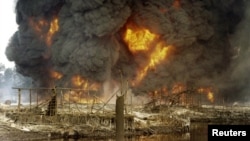Kemepade Ebikpade used to run guns to the Niger Delta militants. Since an amnesty program began in 2009, he's run a welding shop while receiving about $300 a month from the government.
But that money stopped arriving last month with no explanation, according to Ebikpade and 10 other ex-militants VOA spoke with.
Ebikpade said that he had no plans to take up arms again, but that some militants might go back to sabotaging oil facilities, particularly the younger militants. He called on President Muhammadu Buhari to do more to address the Delta’s needs.
The current status of the amnesty program is unclear. Local media reported this week that the government was just behind in its payments.
When he took office in May, Buhari said the amnesty program, which has provided job training and cash payments to 30,000 former militants, would end in December. He promised to continue to "invest heavily" in the existing projects while "streamlining" rehabilitation programs. But the government has given no further details.
The Ministry of Niger Delta Affairs did not respond to requests for comment.
Some former militants had said they would take up arms again if the payments ended. They said foreign and local companies make billions of dollars pumping crude from the Delta while local communities are polluted and impoverished.
Niger Delta activist Annkio Briggs said Nigeria’s successive governments had failed to develop the Delta. She called for self-determination for the region.
“For us, we have made up our minds that it is no longer acceptable that we should continue to provide all the revenue, most of the revenue, that Nigeria needs and still remain as backwards and as neglected as we are,” Briggs said.
Oil makes up about 75 percent of Nigeria’s budget revenues, and Nigeria’s economy is struggling with the global drop in the price of crude. The price of oil hit a new six-year low this week, falling to just under $37 per barrel.
At the height of the insurgency, militants reduced Nigeria's oil production by about 25 percent. The government would be ill-prepared to handle a similar cut today.
Hilary Ugurum reported from Ughelli, Nigeria; Chris Stein reported from Lagos, Nigeria.












